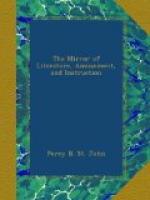Though no language can adequately condemn the base subserviency of Henry’s parliament, it may be reasonably doubted whether his reign was, in its ultimate consequences, injurious to public liberty. The immense revolutions of his time in property, in religion, and in the inheritance of the crown, never could have been effected without the concurrence of parliament. Their acquiescence and co-operation in the spoliation of property, and the condemnation of the innocent, tempted him to carry all his purposes into execution, through their means. Those who saw the attainders of queens, the alteration of an established religion, and the frequent disturbance of the regal succession, accomplished by acts of parliament, considered nothing as beyond the jurisdiction of so potent an assembly.[4] If the supremacy was a tremendous power, it accustomed the people to set no bounds to the authority of those who bestowed it on the king. The omnipotence of parliament appeared no longer a mere hyperbole. Let it not be supposed, that to mention the good thus finally educed from such evils, is intended or calculated to palliate crimes, or to lessen our just abhorrence of criminals. Nothing, on the contrary, seems more to exalt the majesty of virtue than to point out the tendency of the moral government of the world, which, as in this instance, turns the worst enemies of all that is good into the laborious slaves of justice. Of all outward benefits, the most conducive to virtue as well as to happiness is, doubtless, popular and representative government. It is the reverse of a degradation of it to observe, that its establishment among us was perhaps partially promoted by the sensuality, rapacity, and cruelty of Henry VIII. The course of affairs is always so dark, the beneficial consequences of public events are so distant and uncertain, that the attempt to do evil in order to produce good is in men a most criminal usurpation.
[4] The observations of Nathaniel Bacon, or rather of Selden from whose MS. notes he is said to have written his book, deserve serious consideration. Bacon on the Laws and Government of England, chap. 27.
Some direct benefits the constitution owes to this reign. The act which established a parliamentary representation in so considerable a territory as Wales may be regarded as the principal reformation in the composition of the House of Commons since its legal maturity in the time of Edward I. That principality had been divided into twelve shires: of which eight were ancient,[5] and four owed their origin to a statute of Henry’s reign.[6] Knights, citizens, and burgesses were now directed to be chosen and sent to parliament from the shires, cities, and burghs of Wales.[7] A short time before, the same privileges were granted to the county palatine of Chester, of which the preamble contains a memorable recognition and establishment of the principles which are the basis of the elective part of our constitution.[8]




